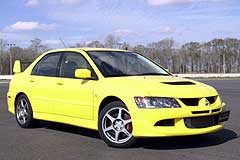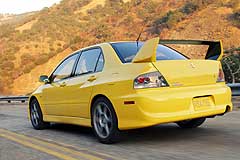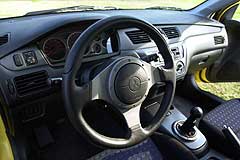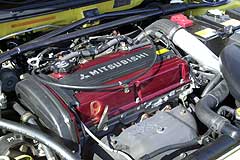
Car Review of the 2003 Lancer Evolution Compact Sports Sedan
Base MSRP Range: $29,987 to $30,217
Base Invoice Range: Not Available
MSRP As Tested: Not Available
Vehicle Category: Compact Sports Sedan
Engine Location: Front Engine
Drive Wheels: All Wheel Drive
Engine As Tested: Standard 2.0-liter, Dual Overhead Cam, 16-valves, Turbocharged, Inline Four Cylinder, 271 -horsepower at 6,500 rpm and 273 lb-ft torque at 3,500 rpm.
Transmission As Tested: 5-Speed Manual
Fuel Economy (city/hwy): 18/26
Standard Safety Features: Driver and front passenger airbags, 3-point seatbelts and headrest for all occupants, 4-channel
Competition: Subaru WRX STI, Audi A4 1.8T, Mazda Mazdaspeed Protégé, Nissan Sentra SE-R Spec V, Dodge Neon SRT-4
New Orleans, Louisiana. -- It appears to be an impromptu street chase: A vintage Toyota Supra Turbo with race-ready bodywork sticks tight on our tail through suburbs of the Big Easy as we wind our way out to the middle of nowhere and Grand Bayou Raceway for some fast track time in a street-legal version of Mitsubishi's hot new rally-racing sedan.
Turn by turn, one quick dash after another, a lightning-fast leap across one intersection, even a flat-out burst for a mile-long romp on the freeway heading south out of town: No matter what maneuver we make, the chaser follows.
Finally, we whip into a parking lot and the tracking car pulls into an adjacent slot as the twenty-something driver, hair tipped blonde in spikes and a silver stud protruding from the chin, dances around our low-slung test car with its big wheels and the carbon-fiber spoiler wing flying high above the back deck.
"Dude," he exclaims with unabashed excitement. "You've got the Evo!"
And so we do.
Nicknamed 'Evo' in rally racing circles and on the Internet in aficionado chat rooms, Mitsubishi's World Rally Championship (WRC) race cars have morphed through successive generations under the badge of Evolution -- from Evolution I through Evolution VI.
The new seventh issue Evolution VII serves as prologue for a model coming to North America under the name of Lancer Evolution.
It's a high-performance version of Mitsubishi's Lancer compact sedan but motivated by a souped-up turbo engine and equipped with all-wheel-drive (AWD) traction.

Consider this new Evo as the sum of all performance and competition technologies developed by Mitsubishi's trophy-grabbing WRC racing campaign over the past decade.
It looks like one of those customized sport compact cars so hot now on the street-racing circuit in Los Angeles and captured on the big screen in "The Fast and the Furious" flick. And Lancer Evolution's forerunner Evolution VII racer makes its screen debut in the sequel movie "2 Fast 2 Furious" in the summer of 2003.
But don't confuse Lancer Evolution with the Lancer sedan because new Evo is not really a Lancer -- at least not in spirit and performance.
Lancer the Mitsubishi compact sedan arrived in America two years ago as an economy car with sporty airs.
It splits into three trims including the O-Z Rally, the label lifted from a brand of flashy wheels by O-Z Racing and with add-on fixtures inspired by Mitsubishi's rally racers, such as extensions for bumpers in front and back plus curvy low side air dams.
Despite such too-cool styling, the O-Z Rally edition and other Lancers draw strength from a 2.0-liter four-cylinder engine that musters only 120 hp.
The fast-and-furious like those tuned to Mitsubishi's success on the WRC circuit want more from Lancer -- they drool for a street-legal version of the Evolution racer.
New Lancer Evolution, emerging this spring with a 2004 model-year designation, aims to sate that pent quest for the Evo rally car.
Check out its rippled body.
It looks ready to tear down the block with the bulging air scoop on the hood, a curvy air dam up front, pontoon-style fenders, Enkei high-strength aluminum alloy wheels capped by Yokohama ADVAN high-grip tires, the carbon-fiber spoiler on the tail and a driver's-oriented cockpit fitted with bolstered Recaro sport bucket seats, leather-wrapped Momo three-spoke steering wheel and rally-style round gauges in the instrument panel with black faces and vivid red letters.

There's a five-speed manual stick shifter on the console ringed by trim that looks like brushed titanium.
Evo's reinforced chassis, derived from Lancer, is designed to check the car body's tendency to sway laterally through a curve so the passenger compartment remains relatively flat.
The platform's wide-track stance in conjunction with an independent suspension system biased toward a low longitudinal roll center contributes predictable stability for Evolution when it's steered through a curvy course.
Likewise, the rear suspension -- in multi-link wishbone configuration with forged aluminum trailing and lateral links plus cast aluminum cross bracing -- holds the back wheels in line while also damping vertical movement prompted by pavement bumps.
The car exhibits awesome stick-to-the-road ability because of the all-time AWD device with a viscous coupling center differential plus rear limited-slip differential.
And to retard all of the power stoked below the Evo hood, there are four big Brembo brand ventilated disc brakes tied to a four-channel anti-lock brake system (ABS) and electronic brake force distribution (EBD).

The heart of Evo is that power-pumping engine.
Evo's 2.0-liter four-in-line engine -- a turbo-charged and inter-cooled version of the 4G63 plant propelling every edition of the Lancer Evolution rally racer -- makes incredible muscle.
It serves up 271 hp at 6500 rpm plus 273 lb-ft of torque at 3500 rpm. How swift does it get?
Mitsubishi's own tests in Lancer Evolution indicate it can sprint from a stoplight start to 60 mph in only five seconds but the top speed runs as high as 155 mph.
We never touch that top limit during our track tests at Grand Bayou Raceway, due in part to the curlicue layout of the course. However, it's easy to run quickly up to triple-digit speeds on the track's front straightway.
Mitsubishi packages Evolution with a long list of standard equipment. In addition to stock gear like the AWD system, Brembo brakes and Recaro seats, Evo comes with air conditioning, power windows and door locks, keyless entry and 140-watt audio system with CD deck and six speakers.
The carbon-fiber spoiler and a power-controlled tilt and slide sunroof are the only options.
Evo's MSRP runs to $28,987. The spoiler adds $480 and a sunroof is $750 more, so the fully loaded Evolution tallies to $30,217, plus a $582 delivery fee.
Editors' Ratings
Pros: Very quick, race car handling and performance, very unique.
Cons: Ride is rough, but that is the compromise for the handling.
Ratings (1-10)
- Style: 7
- Performance: 9
- Price: 8
- Handling: 8
- Ride: 7
- Comfort: 7
- Quality: 7
- Overall: 7.3
More Data
Where Built: Not Available
Major Options: Indash 6-disc CD changer, Sunroof, Full-size color-keyed rear spoiler with black carbon-fiber airfoil.
Seating: 5
Number of Rows: 2
Crash Test Ratings:
- NHTSA Frontal Impact/Driver Crash Test Rating: Not Yet Tested
- NHTSA Frontal Impact/Passenger Crash Test Rating: Not Yet Tested
- NHTSA Side Impact/Front Seat Crash Test Rating: Not Yet Tested
- NHTSA Side Impact/Rear Seat Crash Test Rating: Not Yet Tested
- NHTSA Rollover Resistance Rating: Not Yet Tested
- IIHS Frontal Offset Crash Test: Not Yet Tested
Length in Inches: 178.5
Warranties: 3 years/36,000 miles bumper-to-bumper, 5 years/60,000 miles Powertrain, 7 years/70,000 miles Corrosion.
Weight in Pounds: 3,263.
Cargo Capacity in Pounds: Not Available
Gross Maximum Vehicle Weight in Pounds: 4,222
Towing Capacity in Pounds: Not Available
Gas Tank Capacity in Gallons: 14.0
Destination Charge: $582




